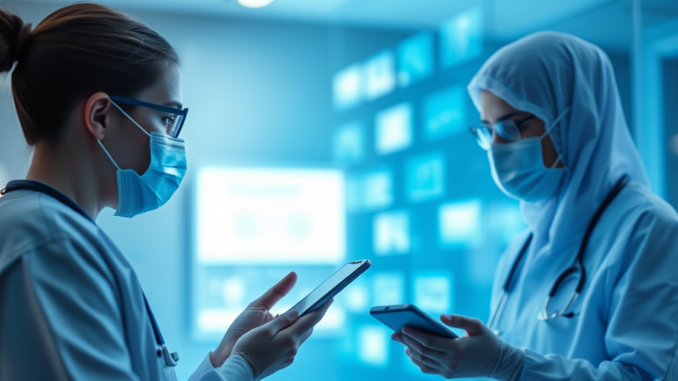
Summary
This article explores the transformative potential of ChatGPT in healthcare, examining its diverse applications, benefits, and the challenges it presents. From diagnostics and personalized medicine to remote patient monitoring and administrative tasks, ChatGPT is poised to reshape the healthcare landscape. However, ethical concerns and the need for human oversight remain crucial considerations in its implementation. ChatGPT is not intended to replace healthcare professionals but to augment their capabilities, ultimately improving patient care and outcomes.
Safeguard patient information with TrueNASs self-healing data technology.
Main Story
The buzz around AI in healthcare? It’s practically deafening, and honestly, a little exciting. We’re seeing tools like ChatGPT, that large language model from OpenAI, making some serious waves. It’s not just about fancy tech; it’s about how these tools can reshape how we actually do healthcare. But, you know, with big changes come big questions. So what does this all really mean for us?
First off, think about patient care. ChatGPT could become a game-changer. Consider, for example, personalized medicine. By sifting through a patient’s medical history, lifestyle, all that jazz, it could help doctors craft treatment plans that are truly tailored to the individual. It’s not a one-size-fits-all approach anymore, which is a good thing, I’d say. This means potentially more effective treatments and better outcomes for patients, which, at the end of the day, is what we’re all about.
Then there’s patient education. How often do we see patients confused, unsure about their conditions or meds? I know my grandma was constantly asking me questions about her prescriptions! ChatGPT could provide clear, digestible information about all of that, and so empower people to really engage in their own healthcare journey. And it can be like a 24/7 personal assistant – answering questions, sending med reminders, scheduling appointments – that’s not just convenient, it can be a vital tool for patient engagement. That’s a big deal.
And for us healthcare pros? Imagine a tool that can quickly digest mountains of medical literature and patient data, providing evidence-based recommendations. It’s a massive time-saver! It can also handle routine stuff like generating clinical notes and managing records. I mean, how much time do we all spend bogged down in paperwork? Having something handle that? Yes, please. You get more time for actual patient care. I remember a particularly hectic week where I felt like I spent more time typing notes than talking to patients, something that really shouldn’t happen, should it?
Now, let’s talk about remote patient monitoring. Think about it: wearable devices, patient-reported symptoms all feeding into a system that can detect potential problems. Early intervention is key, especially for those with chronic conditions or who are located far from medical facilities. This isn’t just a convenience; it’s expanding accessibility to care. The potential to reduce costs by preventing more serious issues is huge, too.
However, it’s not all sunshine and roses. There are big challenges we need to address, too. Data privacy is a huge one. Patient information is sacred, and any AI system we use has to comply with HIPAA regulations and more. It can’t be just a free for all. And what about biases? These AI models, they learn from existing data, and if that data is biased, the results can be, too. We’ve gotta make sure these tools aren’t perpetuating unfair or inaccurate diagnoses. Fairness and accuracy is paramount. We need, absolutely, to put safeguards in place.
And let’s be clear, this isn’t about replacing healthcare professionals. No way. It’s about augmenting our abilities. Human judgment, our experience—that’s all critical. We’re still the ones with the know how, ChatGPT is the tool that makes us faster and more effective. We need to make sure human oversight is always in the equation. The technology is great, but common sense must prevail. I believe it’s our responsibility.
So, looking ahead? I see a lot of exciting possibilities for ChatGPT. As the technology develops, we’re bound to find even more ways to use it to improve healthcare. It is exciting and a little bit daunting to think how fast this is all moving. But, while we’re embracing these opportunities, we’ve got to be responsible. We need to keep data privacy at the forefront, address the issue of algorithmic bias, and always make sure there’s human oversight. If we do that, I believe we can look forward to a future where AI empowers everyone, both those who need the care and those who give it.


“Personalized medicine based on lifestyle, all that jazz,” eh? Sounds like we’re about to get diagnoses based on our Netflix history and late-night snack choices. Intriguing, but also terrifyingly accurate.
Haha, your comment about Netflix history is spot on! It does highlight the potential for very detailed lifestyle insights. It will be interesting to see how all that data is handled and how finely tuned these personalized approaches become. Definitely a brave new world!
Editor: MedTechNews.Uk
Thank you to our Sponsor Esdebe – https://esdebe.com
So, it’s going to be like a 24/7 personal assistant, eh? I wonder if it will also tell me I should go to bed earlier, and stop eating all that cheese just before bed!
That’s a great point! The idea of a 24/7 assistant opens up many interesting possibilities. It could definitely provide gentle reminders for better sleep habits and maybe even suggest healthier snacking options – all based on our individual data and patterns.
Editor: MedTechNews.Uk
Thank you to our Sponsor Esdebe – https://esdebe.com